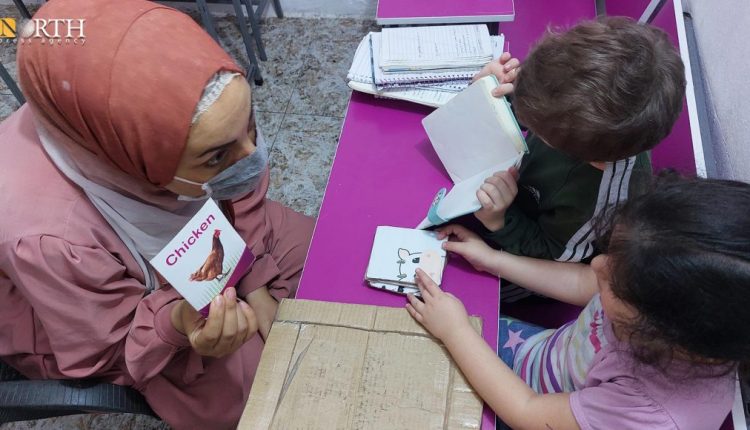
By Zaina Abdi
QAMISHLI, Syria (North Press) – A lack of specialized language disorder treatment centers is leaving Syrian families in Northeast Syria struggling to help their children, facing financial obstacles and limited resources for essential therapies.
Baz Ibrahim, a five-year-old child from the city of Qamishli in Northeast Syria, has grappled with a language disorder for three years, a struggle exacerbated by his family’s limited financial means and the scarcity of professional treatment centers in the region.
Children with language disorders often experience stuttering, speech delays, and related behavioral challenges. According to Dr. Ahmad al-Saleh, a pediatrician in Qamishli, these issues have become increasingly common over the past decade.

He describes these conditions as “a disease of the era” among local children, and notes they often accompany signs such as poor response to commands, mood swings, and irritability.
Baz’s mother, Mardin Murad, began noticing behavioral issues in her son after he contracted COVID-19 and started using mobile devices frequently.
Following his recovery, Baz displayed not only speech delays but also irritability, strange expressions, and frequent distraction. His mother sought help, initially traveling to Sulaymaniyah in Iraq, but returned to Qamishli due to high treatment costs and began attending sessions at a local center.
Amina Youssef, director of a speech therapy center in Qamishli, highlights that the scarcity of facilities and trained staff in Northeast Syria complicates treatment. Financial constraints deter many families from seeking assistance, and existing centers are under-resourced, often unable to meet the region’s needs.
Language specialist Solin Omar attributes this shortage to the lack of training programs at local universities. She underscores the importance of centers offering diverse therapies, including psychomotor, occupational, and audiology support. Many cases are complex, requiring individual assessment and specialized plans.
Pediatric neurologist Dr. al-Saleh explained that speech delays come in various forms, each demanding unique treatment approaches. While expressive speech delay generally responds well to therapy, receptive delays may require hearing aids. In more complex cases involving neurological or behavioral conditions, specialized interventions are necessary.
Families in Northeast Syria are calling for support from the Autonomous Administration and international organizations to establish more centers with trained professionals to support children with language disorders, ultimately fostering their communication and social skills.
